Published Jul 10, 2014
Ten For Ward: 10 Star Trek Episodes That Can Work As Stage Plays
Ten For Ward: 10 Star Trek Episodes That Can Work As Stage Plays
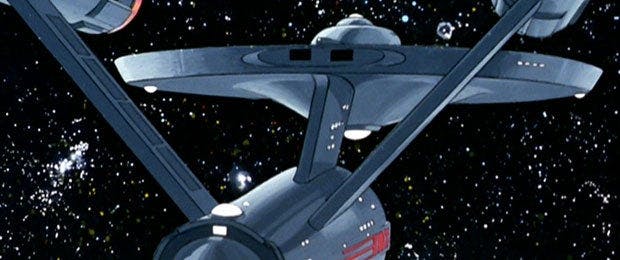
With blockbuster movies and their big-budget special effects spectacle that threatens to overwhelm every other aspect of their production, and Star Trek getting some of that attention in recent years, we Trekkies remain a demanding lot. We like our action and ship porn, to be sure, but we also want a great story that showcases the best (and sometimes the worst) of our favorite characters. “The play’s the thing,” so to speak.
It’s long been argued that the very best Star Trek episodes rely not on special effects or elaborate action, but instead on their story and the dialogue spoken by their characters. Indeed, many of these episodes come off feeling like stage plays, in large part because they were written that way out of budgetary necessity. It’s not a totally left-field idea, you know. In fact, it’s not uncommon to hear about groups of actors performing versions of classic Star Trek tales on stage before live audiences.
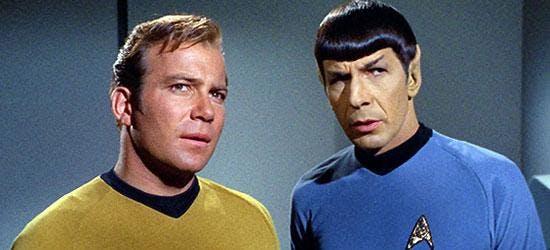
So, let’s take that idea and run with it. What are some of the best Star Trek episodes that lose nothing by taking away “that other stuff?” I don’t think coming up with ten is the problem, but it’s what I’ll stick with, because that’s my gimmick.
Now, it should be understood that the episodes I’m listing—and even ones offered by readers in the comments—almost certainly would require “tailoring” for presentation on the stage. Whether that means adding, reworking, or eliminating scenes is fodder for discussion in the comments. With that in mind, here are (my first) ten, listed in no particular order:
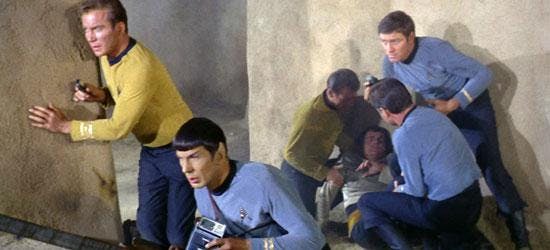
“Arena” (Star Trek) – One of my favorite Original Series episodes is also, for whatever the heck my opinion’s worth, one of the show’s better “humans get tested by advanced aliens” stories. We forgive the rubber Gorn costume because we’re busy rooting for Kirk to build his bamboo cannon, but it’s the tension in the early scenes, followed by the captain’s obsessive chase and his battle with the Gorn captain, and finally his confrontation with the judgmental Metron that sell this episode. Even with the restructuring required for stage play sensibilities, I think the story’s heart and soul would make the translation.

“Far Beyond the Stars” (Star Trek: Deep Space Nine) – For my money, this is one of Star Trek’s finest hours across any of the series. Heck, to put this up as a stage show, you could just set the entire thing in the 1950s, and allow Benny Russell to show us the 24th century trappings through the power of his words and imagination. The core story of Russell’s struggle with racial inequality, civil rights and his simple desire just to be treated with basic human dignity certainly wouldn’t lose any of its power.
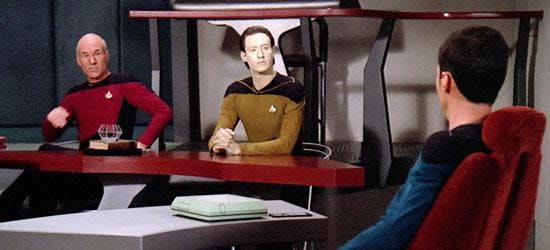
“The Measure of A Man” (Star Trek: The Next Generation) – a jewel not just of the show’s second season but of the entire series, this is my personal favorite of the ten choices I’ve made here. This seminal story, in which Data is caught up in a legal proceeding to determine his status as either Starfleet property or an individual with inalienable rights, is Star Trek at its very best. The episode contains no action pieces and only a handful of effects scenes, none of which would be missed if this story were adapted for the stage. Picard’s questioning of Commander Maddox during the final scenes ranks up there with some of the best courtroom dramas, such as Twelve Angry Men, To Kill A Mockingbird, or A Few Good Men (all of which, as it happens, either were adapted to or from stage plays).
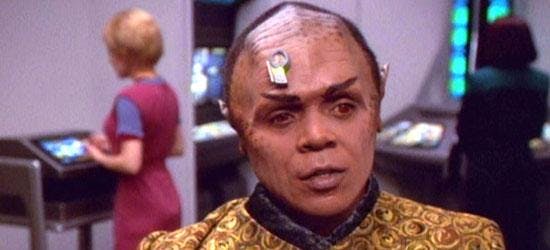
“Tuvix” – (Star Trek: Voyager) – Is it any surprise that I’d include one of the series’ most-discussed, debated, and hotly argued episodes? After a transporter accident “fuses” Tuvok and Neelix into a single person, “Tuvix,” an agonizing moral dilemma with no easy answers is handed to Kathryn Janeway. The captain must choose between Tuvix—a sentient being who wants only the right to exist—and the two individuals who can only be restored through his sacrifice. This is just great Star Trek.
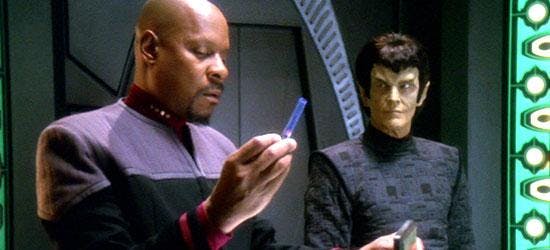
“In the Pale Moonlight” (Star Trek: Deep Space Nine) – This is already pretty much a one-man show as it is, with Benjamin Sisko recounting into his personal log how he colluded with Garak to force the Romulan Empire to stand at the Federation’s side in its war against the Dominion. Only now, we’d have him sitting in a chair at the edge of the stage, confessing his sins to an engrossed live audience, while the events he recounts are acted out behind him. Can you imagine Avery Brooks—with that commanding, thundering voice that is so uniquely his—reprising his role for something like this? I’m all tingly just thinking about it.
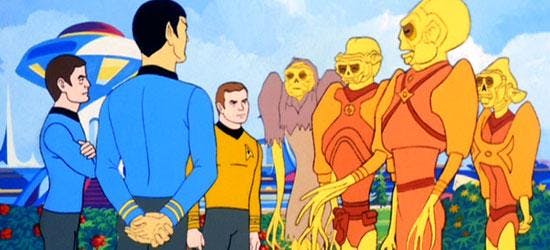
“Albatross” (Star Trek: The Animated Series) – Look at me, throwing a little love toward The Original Series’ Saturday morning progeny. This was one of the animated show’s better episodes, in which Doctor McCoy is accused of causing mass genocide years earlier when a plague ravages the population of an alien planet. The story was one worthy of the live-action series, and arguably suffers from having to be tempered for a typical Saturday morning audience. Revisiting the story for the stage would allow for deeper examination of McCoy’s past and his role in the genocide—whatever it might have been—without having to pull any punches.

“Bride of Chaotica!” (Star Trek: Voyager) – As with “Far Beyond the Stars,” I’d be all for a story like this jettisoning all of the 24th century story elements, this time to focus on the rip-roaring fun to be had with Captain Proton and Buster Kincaid facing off against the evil Dr. Chaotica. Any excuse for us to see some version of all those crazy retro sets, ships, ray guns and evil robots works for me.
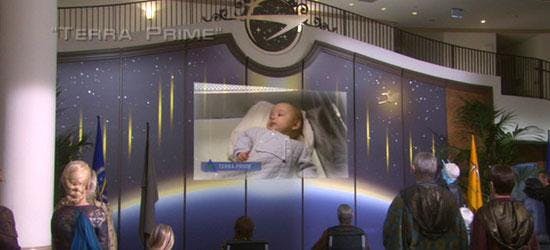
“Demons"/"Terra Prime” (Star Trek: Enterprise) – Many fans consider this two-part episode the series’ true finale. The themes it explores with respect to whether humanity—still coming to terms with the reality of intelligent life on distant worlds—truly is ready to join an interstellar community bring to a head many of the questions and discussions that define the era in which the show takes place. I think a stage treatment of the story would also be able to focus more on the story’s central antagonist, John Frederick Paxton, and how he came to act in accordance with the beliefs he’s embraced. If that means we get more Peter Weller, I’m in.
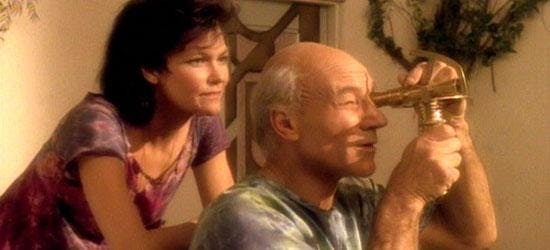
“The Inner Light” (Star Trek: The Next Generation) – Another fan favorite episode, with Picard manipulated by an alien probe so that he “replays” the life of a man who died on a planet destroyed centuries earlier so that he might understand the civilization that was lost. The story already focuses the bulk of its attention on the world in which Picard is immersed, but the 24th century framing sequences also are important; particularly those final moments after Picard has emerged from his trance on the Enterprise and realizes the enormity of what he’s experienced.
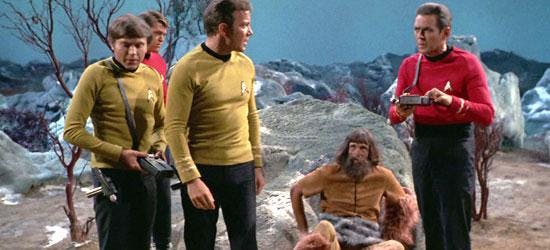
“Spock’s Brain” (Star Trek) – Hey, I didn’t say they all had to be dramas, right? In fact, this is one of the episodes that helps prove this whole idea can work. Back in 2004, a live stage production of the tale was performed by an acting troupe in Irvine, California to rave reviews and sold-out dinner-house audiences. The cast was able to mine the original script for laughs without changing a single word, but instead simply exaggerating some of the more groan-worthy lines and punctuating the dialogue with overly dramatic music cues. Personally, I think they were on to something. They should’ve done “Plato’s Stepchildren” next.
Okay, that’s ten to get us started, and I think it’s safe to say we could keep going with no trouble. As always, my choices aren’t intended to be a “definitive” list, but instead a springboard for further discussion, and I welcome your thoughts and suggestions in the comments.Check out the “Ten for Ward” Backlist
Dayton Ward is the New York Times bestselling author or co-author of numerous novels and short stories, including a whole bunch of stuff set in the Star Trek universe, and often working with friend and co-writer Kevin Dilmore. He’s also written (or co-written) for Star Trek Communicator, Star Trek Magazine, Syfy.com, and Tor.com, and is a monthly contributor to the Novel Spaces writers blog. As he is still a big ol’ geek at heart, Dayton is known to wax nostalgic about all manner of Star Trek topics over on his own blog, The Fog of Ward.

